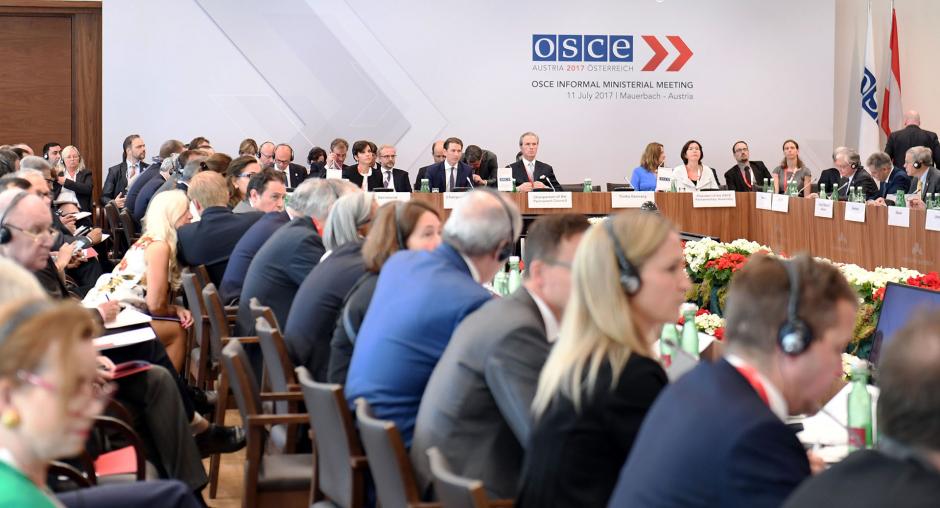Dialogue crucial for addressing Europe’s security challenges, OSCE Chairperson-in-Office Sebastian Kurz emphasizes at Informal Ministerial Meeting

MAUERBACH, Austria, 11 July 2017 – Dialogue, co-operation and compromise are crucial to addressing the security challenges facing Europe, OSCE Chairperson-in-Office and Austrian Foreign Minister Sebastian Kurz said today at an informal meeting of the foreign ministers of the OSCE’s participating States in Mauerbach, on the outskirts of Vienna.
During the meeting, which was dedicated to the theme “Building Trust through Dialogue and Co-operation”, some 30 foreign ministers, several deputy foreign ministers as well as senior foreign ministry officials from the OSCE’s 57 participating States held informal discussions on finding common solutions to challenges to European security.
“Six months into Austria’s OSCE Chairmanship, it is important we meet together in an open and informal setting to frankly discuss the challenges in the OSCE region,” said Kurz. “Alongside military conflicts in the region, we face the challenge of violent extremism and radicalization that leads to terrorism. All these challenges can only be addressed through the active engagement of all our participating States.”
He said that an honest exchange is essential to overcoming the current divisions in Europe.
"We have a crisis of confidence among OSCE participating States. The crisis in and around Ukraine has split our continent,” said Kurz. “We share the same goals and values, we should talk about them so that we can bridge our differences.”
On Ukraine, Kurz warned that daily artillery fire and ceasefire violations are putting critical infrastructure in the east of the country at great risk, threatening a humanitarian disaster for tens of thousands of people who could be left without power, water and gas. Fighting near chemical stores and industrial mines could lead to an ecological disaster, he said.
“I call on all sides once again to cease fire in line with the Minsk agreements and stop putting civilian lives at risk,” he said. “I also remind the sides in eastern Ukraine of their obligations to ensure the freedom of movement of the monitors of the OSCE Special Monitoring Mission to Ukraine.”
As an important forum for dialogue, the OSCE Chairperson-in-Office said that the Organization allows for a variety of formats for participating States to engage.
“Informal exchanges are instrumental in overcoming the blockages in institutional processes, and accelerate decisions on key matters, such as the appointment of senior officials,” he said. “I am optimistic that we have a political understanding on the appointments, and we will formalise the positive signals that we got at Mauerbach.”
Following the plenary session of the meeting, two roundtable sessions were held. In the first, on the fight against violent extremism and radicalization leading to terrorism, ministers emphasized that the OSCE should enhance its activities in this field and make full use of its comprehensive approach to security.
"As the territorial aspirations of the so-called Islamic State are coming to an end, the terrorist threat in the OSCE region might yet increase. We need to be prepared for that," said Peter Neumann, the OSCE Special Representative on Countering Radicalization and Violent Extremism, as he opened the discussion.
The second roundtable discussion focused on the so-called Structured Dialogue on current and future challenges and risks to security in the OSCE area, which was launched by Kurz in February on the basis of a Declaration adopted by the OSCE Ministerial Council in Hamburg last year. Participants noted the importance of seizing the momentum of previous Structured Dialogue discussions on threat perceptions, military doctrines and trends in military force postures, and explored how to deepen the conversation.
The OSCE Informal Ministerial Meeting was designed to frame discussions ahead of the annual OSCE Ministerial Council, which this year will take place on 7 and 8 December in Vienna.
